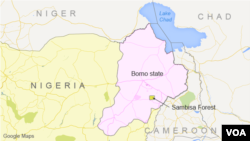Witnesses say Boko Haram militants have executed 11 members who were accused of deserting the Islamist extremist group.
Residents of Miringa, a town in Nigeria's Borno state, say Boko Haram fighters entered their town before dawn Friday and went house to house looking for the alleged defectors.
One resident, Muhammed Kimba, told reporters by phone that at daybreak, 11 people were found "slaughtered" at the Eid praying ground outside of town. He said all 11 were recent arrivals who residents had suspected as possible Boko Haram members.
A Nigerian newspaper, This Day, reports that militants killed the 11 by slitting their throats.
Also Friday, heavy gunfire was heard on the edges of the Borno state capital, Maiduguri. Witnesses in the village of Zabarmari just outside the capital say suspected Boko Haram fighters attacked the town the late Friday, battling with Nigerian troops.
Boko Haram is blamed for several attacks this week and the killing of more than 150 people, in the deadliest wave of violence since President Muhammadu Buhari took office May 29.
Deadly attacks
On Wednesday, suspected militants massacred 97 people in the town of Kukawa near Lake Chad. On Tuesday, militants shot dead 48 people near the town of Monguno.
All of the attacks have been in Borno state, the epicenter of Boko Haram's six-year insurgency.
Last month, the president moved the military's command center to the state capital, Maiduguri, as part of efforts to crush the group, which is fighting to impose a strict Islamic state on northeast Nigeria.
Nigeria and four nearby countries are in the process of setting up a regional military force to fight the militants. They include Chad, Cameroon and Niger, which helped Nigerian forces retake towns in the northeast from Boko Haram earlier this year.
Boko Haram, whose name in the Hausa language means "Western education is a sin," has attacked countless villages, bus stations, markets, government buildings and places of worship since launching its insurgency in 2009.
The group has killed thousands of people and driven an estimated 1.5 million Nigerians from their homes.





